May 19, 2014: City Council Meeting Preview
The council’s second meeting in May is specified in the city charter as the occasion for the council to adopt the city administrator’s proposed budget with any amendments. If the council does not take action by its second meeting in May, the city administrator’s proposed budget is adopted by default.
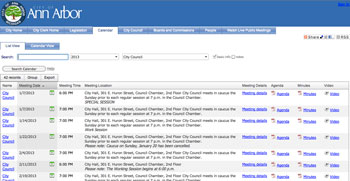
Screenshot of Legistar – the city of Ann Arbor’s online agenda management system. Image links to the May 19, 2014 meeting agenda.
A preview of some possible budget amendments will be reported separately.
The council’s May 19, 2014 meeting agenda includes more than just the adoption of the budget.
Related to the setting of the annual budget are items like setting fees associated with the public services area (for example, site plan review) and the community services area (for example, farmers market stall fees), as well as rate increases for water, sewer and stormwater utilities.
Also related to the budget – and not just for this next year – is an agenda item that will revise the city’s policies for contributions to the city’s pension system and retiree health care. In broad strokes, those revisions are meant to accelerate contributions during a strong economy and maintain contributions at least at the level of the actuary-recommended amount during weaker economies.
Another budget-related item on the May 19 agenda is one related to the social infrastructure of the community – allocation of general fund money to nonprofits that provide human services. The city approaches this allocation through a process that is coordinated with Washtenaw County, the United Way, the Ann Arbor Area Community Foundation and other partners. The total amount allocated for operation of programs is about $4.3 million. The city of Ann Arbor’s general fund contribution is about $1.2 million, which is the same amount that has been contributed for the last several years.
Related to human services support is an agenda item that would accept a $113,154 planning grant from the Michigan Supreme Court to establish a specialized mental health court.
Along with social infrastructure, the council will also be asked to approve an allocation that includes utilities infrastructure, to address the needs that resulted from the harsh winter. The resolution the council will consider would allocate money from the fund balance reserves from three sources: $1.7 million from the major street fund, $638,000 from the local street fund, and $666,000 from the water fund. Those amounts include $461,171 from the state of Michigan.
The council will also be asked to approve money for building new physical infrastructure – about $2.6 million for the reconstruction of a segment of Pontiac Trail. The segment stretches north of Skydale Drive to just south of the bridge over M-14/US-23. The street reconstruction project also includes water mains, sanitary sewer, and construction of new sidewalk along the east side of Pontiac Trail, and installation of bike lanes.
Special assessments to pay for three other sidewalk projects also appear on the council’s agenda in various stages of the special assessment process. Those future projects are located on Barton Drive, Scio Church Road, and Newport Road.
The council will be asked to approve the city’s application for federal funding to support the acquisition of development rights in Superior Township for two pieces of property on either side of Vreeland Road. The properties are near other parcels already protected as part of the city’s greenbelt initiative.
The city council will also vote on the confirmation of two appointments: Katherine Hollins to the city’s environmental commission; and Bob White, as a reappointment to his fourth term on the city’s historic district commission.
This article includes a more detailed preview of many of these agenda items. More details on other agenda items are available on the city’s online Legistar system. The meeting proceedings can be followed Monday evening live on Channel 16, streamed online by Community Television Network starting at 7 p.m.
Fees and Rates
On the council’s agenda are rate increases for utilities (water, sewer and stormwater) as well as fee increases for the public services and community services area.
Fees and Rates: Water, Sewer, Stormwater
Water rates are proposed to increase across all tiers of consumption. For the first 7 “units” of water, the charge is proposed to increase from $1.35 to $1.40. For the next 21 units, the charge is proposed to increase from $2.85 to $2.96 per unit. And for the 17 units after that, the increase is proposed to be from $4.88 to $5.08. A unit is 100 cubic feet, which is 748 gallons.
Sewer rates would increase from $3.65 to $3.85 per unit. And stormwater fees would increase for all tiers of impervious service. For the middle tier – for more than 2,187 square feet but less than or equal to 4,175 square feet – on a quarterly basis, the increase would be from $24.85 to $26.32.
According to the staff memo accompanying this item, the recommended rate changes in water, sewer, and stormwater would increase revenues to the water, sewer, and stormwater funds by $765,119, $1,171,931 and $410,235 respectively. The reason given for the rate increases is to cover maintenance and debt payments, and to maintain funding for capital improvement requirements. The city calculates the impact to be an additional $6.25 per quarter or $24.98 per year for an average consumer, which is a net increase of 4.2%.
Water consumption for a typical single family is assumed at 19 units per quarter.

History of city of Ann Arbor water rates. The city converted to a tiered system 10 years ago in 2004, based on usage. The 2015 amount is proposed.
The utility rates are part of a city ordinance. So the council will be considering initial approval at its May 19 meeting, with final approval to come at its first meeting in June – on June 2.
Fees and Rates: Community and Public Services Area
Fee increases in the community services area and the public services area will be considered by the council at its May 19 meeting.
For community services, increases are being proposed for stall fees at the Ann Arbor public market (farmers market). Currently, the basic annual fee for rental of a stall is $300. It’s proposed to be increased to $450 – a 50% increase.
If approved by the council, the fee increase would be projected to generate $26,000 in additional revenue. However, this additional revenue has not been assumed in the proposed FY 2015 budget.
According to the staff memo accompanying the agenda item, “market fees were last increased in 2009 and have not kept pace with the overall increase of annual operating costs during this same time period.” A comparative analysis of Ann Arbor’s fees also showed that Ann Arbor’s fees are well below those of comparable markets.
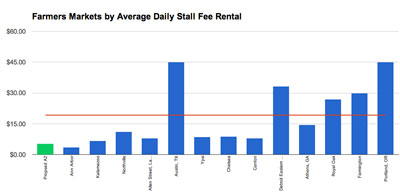
Comparative chart of stall rental rates, including three in other states. Ann Arbor’s current rate is the leftmost blue bar. Ann Arbor’s proposed market stall rental rate is shown in green. The red horizontal line is the average. (Chart by The Chronicle with data from the city of Ann Arbor.)
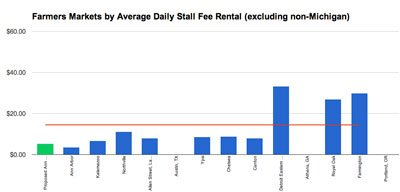
Comparative chart of stall rental rates, excluding those in other states. Ann Arbor’s current rate is the leftmost blue bar. Ann Arbor’s proposed market stall rental rate is shown in green. The red horizontal line is the average. (Chart by The Chronicle with data from the city of Ann Arbor.)
In the public services area, fees for a variety of services are being considered – for such items as site plan review, soil and sedimentation control. According to the staff memo accompanying the agenda item, the increases consider labor, material and supplies, equipment, and overhead cost and are aimed at full cost recovery. The increases are generally in the range of 1% to 5%.
Pension and VEBA Funding Policy
The council will be considering policies for making contributions to the pension and retiree health care plan that is supposed to ensure that the plans are eventually fully funded. The policy would set the funding at the higher of two different figures: (1) the Actuarial Required Contribution (ARC) rate; or (2) the existing level of contributions adjusted for the change in general fund revenues. That would have an impact of establishing a minimum increase in funding of 2% per year.
The operative language in the policy is:
If the General Fund revenues are projected to increase less than 2%, the city’s contribution shall increase 2%; thereby establishing a minimum increase of 2% per year.
Social Infrastructure
The council’s agenda includes two items that can be characterized as funding social infrastructure: the annual general fund allocations to nonprofits that provide human services; and the acceptance of a planning grant for the 15th District Court to establish a mental health court.
Social Infrastructure: Coordinated Funding
The council will be asked at its May 19 meeting to approve funding allocations to nonprofits as part of a coordinated funding approach for human services, in partnership with several other local funders.
The city is one of the original five partners in the coordinated funding approach. Other partners include Washtenaw County, United Way of Washtenaw County, Washtenaw Urban County, and the Ann Arbor Area Community Foundation. It began as a pilot program in 2010.
This year, 105 applications were submitted by 50 local organizations totaling $8,732,389 in requested funding, according to a staff memo. A review committee recommended that 57 programs receive a total of $4,321,494 in available funding. Of that amount, the city is providing $1,244,629.
FY 15 Funding Source $1,244,629 City of Ann Arbor General Fund $1,760,708 United Way of Washtenaw County $1,015,000 Washtenaw County's General Fund $ 274,907 Washtenaw Urban County CDBG funds $ 26,250 Ann Arbor Area Community Foundation senior funds ========== $4,321,494 TOTAL
-
The coordinated funding process has three parts: planning/coordination, program operations, and capacity-building. The approach targets six priority areas, and identifies lead agencies for each area: (1) housing and homelessness – Washtenaw Housing Alliance; (2) aging – Blueprint for Aging; (3) school-aged youth – Washtenaw Alliance for Children and Youth; (4) children birth to six – Success by Six; (5) health – Washtenaw Health Plan; and (6) hunger relief – Food Gatherers.
In 2012, TCC Group – a consulting firm based in Philadelphia – was hired to evaluate the process. As a result of that review, several changes were recommended and later authorized by the city council at its Nov. 7, 2013 and by the Washtenaw County board on Nov. 6, 2013. One of those changes is that funding would not necessarily be allocated to the six priority areas based on the proportion of funding allocated in the past. Instead, allocations among the six priority areas would be based on identified community-level outcomes, the strategies that align with them, and how each are prioritized. An additional change would broaden the pre-screening process so that smaller nonprofits could be accommodated.
Funding for this cycle will start on July 1, 2014. In addition, the RNR Foundation – a family foundation that funded TCC Group’s evaluation of the coordinated funding approach – will now be an additional funder in this process.
The RNR Foundation funding will go toward the planning/coordination and capacity building components of the effort, so their funding is not listed among the items in the program operating component.
Here’s a breakdown of how the program operating component of the city of Ann Arbor’s share will be allocated:
FY 2015 Agency $20,000 Barrier Busters $30,000 Peace Neighborhood Center $35,069 Ozone House Inc. $54,168 Domestic Violence Project Inc. dba SafeHouse Center $56,396 UM Regents (Community Dental Center, Housing Bureau for Seniors) $85,500 Avalon Housing $90,786 Child Care Network $102,156 Food Gatherers $115,558 The Salvation Army of Washtenaw County $122,095 Washtenaw Community Health Organization $160,761 Shelter Association of Washtenaw County $164,660 Community Action Network $207,480 Legal Services of South Central Michigan $1,244,629 Grand Total
-
That compares with the current fiscal year as follows:
FY 2014 Agency $4,561 HIV/AIDS Resource Center $12,772 Washtenaw Association for Community Advocacy $14,282 Planned Parenthood Mid and South Michigan $17,139 Jewish Family Services of Washtenaw County $19,835 Barrier Busters $23,719 UM Regents - Ann Arbor Meals on Wheels $27,369 The Women's Center of Southeastern Michigan $63,419 Home of New Vision $91,645 Interfaith Hospitality Network of Washtenaw County $94,490 Catholic Social Services of Washtenaw $95,171 Food Gatherers $104,944 Community Action Network $109,851 Perry Nursery School of Ann Arbor $142,851 Avalon Housing Inc. $177,052 Services of South Central Michigan $245,529 Shelter Association of Washtenaw County $1,244,629 Grand Total
-
The coordinated funding approach sometimes results in the same programs being funded – but by different funders. This year, the city of Ann Arbor is funding a program for Peace Neighborhood Center; last year Washtenaw County provided funding ($19,995) for Peace Neighborhood Center. And last year, the city of Ann Arbor funded a University of Michigan meals-on-wheels program; this year, United Way is funding that program.
Recipients of funds in one year are not guaranteed funding the following year. An example of that is the Women’s Center of Southeastern Michigan, which received $27,369 from the city of Ann Arbor last year for a mental health program, but is not receiving funds as part of the coordinated funding program this year.
Social Infrastructure: Mental Health Court
The council is being asked to approve the receipt of a planning grant of $113,154 from the Michigan Supreme Court State Court Administrative Office (SCAO) to fund the planning for a mental health court program.
According to the staff memo accompanying the item, mental health courts are problem-solving courts “that focus on therapeutic treatment for offenders with mental illnesses whose crimes are a result of their mental illness.”
The memo continues:
Eligible defendants are diverted into judicially supervised, community-based treatment to address the underlying problems. The program uses a team approach to address the participant’s needs for mental health and/or substance abuse treatment while also linking the participant with ancillary services such as education, housing, job skills or other individualized assistance. The goal is to assist participants in bettering their lives while also benefiting the community by reducing jail time, recidivism rates, and court docket congestion.
The 15th District Court already operates several specialized courts – a sobriety court, a homeless court, veterans court and domestic violence court. The mental health court would be operated in addition to those other specialized courts.
For background on the 15th District Court’s specialized “problem-solving” courts from last year’s Chronicle reporting, see: “Round 1 FY 2014: 15th District Court.”
Physical Infrastructure
Physical infrastructure appears on the council’s May 19 agenda in several forms: an allocation of money to deal with damage to systems from the harsh winter; a Pontiac Trail street reconstruction project; and several sidewalk projects.
Physical Infrastructure: Winter Damage
The council will be asked to approve an allocation that includes utilities infrastructure, to address the needs that resulted from the severe winter weather.
According to the staff memo accompanying the resolution, compared to last year there was a 36% increase in water main breaks and a 950% increase of broken water services. Compared to the previous two years winters, the 2013-14 winter had 272% more snow and a 450% increase in required plowing. That meant additional use of materials like ice-control salt, sand, cold-patch, pipe, repair clamps and fittings – in addition to higher-than-anticipated work hours and overtime, and increased equipment costs.
The resolution the council will consider would allocate money from the fund balance reserves from three sources: $1.7 million from the major street fund, $638,000 from the local street fund, and $666,000 from the water fund. Those amounts include $461,171 from the state of Michigan.
The work will include frozen service line repairs, pavement marking, and road surface repair. The work is not anticipated to be completed until well after June 30, 2014 – the end of the current fiscal year.
At a May 12 city council work session, public services area administrator Craig Hupy presented the council with some data on the age of the city’s piping system, saying that for the water pipes, those that were constructed in 1950s, 1960s and 1970s are more problematic than those built before and after that period. Still, he indicated that the city’s breakage rate was considered low for a system that is as old as Ann Arbor’s.
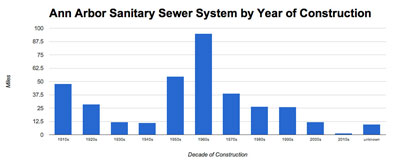
Ann Arbor Sanitary Sewer System by Year of Construction. (Data from the city of Ann Arbor, chart by The Chronicle)
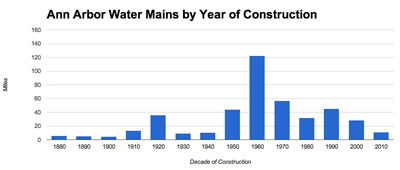
Ann Arbor Water System by Year of Construction. (Data from the city of Ann Arbor, chart by The Chronicle)
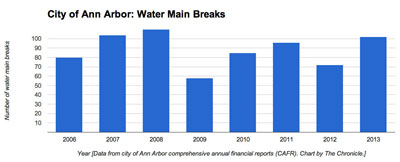
City of Ann Arbor Water Main Breaks by Year. (Data from city of Ann Arbor Comprehensive Annual Financial Report)
Physical Infrastructure: Pontiac Trail
The council will consider two resolutions in connection with a street reconstruction project on Pontiac Trail.
The first is a $2,605,190 contract with Evergreen Civil LLC for construction of the project. According to the staff memo accompanying the resolution, the project includes reconstruction of Pontiac Trail beginning north of Skydale Drive to south of the bridge over M-14/US-23. The project also includes extending water mains and sewer pipes, as well as construction of new sidewalk along the east side of Pontiac Trail, and installation of bike lanes. The memo also indicates the project will include stormwater infiltration trenches, edge drains, and the addition of a small section of curb and gutter. The project is expected to begin in June of 2014 and be completed by fall of 2014.
The other contract to be considered by the council in connection with the Pontiac Trail project is $46,879 for Professional Services Industries Inc. for materials testing.
Responding to a query from The Chronicle, city project manager Nick Hutchinson indicated that the council would be presented at its June 16 meeting with the next in a series of resolutions on special assessment to help fund the sidewalk portion of the Pontiac Trail project. The council had voted at its Jan. 21, 2014 meeting to direct the city administrator to prepare plans, specifications and a cost estimate for the Pontiac Trail sidewalk project. The special assessment process requires the setting of an assessment roll and the holding of a public hearing before a special assessment can be imposed.
Physical Infrastructure: Sidewalks
Three other sidewalk projects that are further along in the special assessment process than Pontiac Trail are also on the council’s May 19 agenda: Barton Road, Scio Church and Newport Road.
Physical Infrastructure: Sidewalks – Newport Road
A public hearing on the Newport Road sidewalk special assessment, which started on May 5, will continue at the council’s May 19 meeting. For the sidewalk segment on Newport Road, the council had approved at its April 21, 2014 meeting a resolution directing the city assessor to prepare a special assessment roll of properties to be assessed. The council took action to set the public hearing on the Newport Road special assessment for May 5.
The total amount to be special assessed for the Newport Road project is $49,746. But residents of the Newport Creek Site Condominium – who would not ordinarily be assessed, as their property isn’t adjacent to the sidewalk – have volunteered to contribute $10,228 to the project to help offset their neighbors’ assessments. Details of that arrangement are being finalized.
However, several residents spoke at the May 5 public hearing, opposing the special assessment.
Physical Infrastructure: Sidewalks – Scio Church
Again on the city council’s May 19 agenda are resolutions to set the assessment roll and set a public hearing (to be held June 16) for the special assessment of a Scio Church Road sidewalk. Action on the Scio Church sidewalk project special assessment had been postponed at the council’s April 21, 2014 meeting until May 19.
For this sidewalk project, the total cost is expected to be $365,100. Of that, about $164,000 will be paid from a federal surface transportation grant. The remaining $201,100 will be paid out of the city’s general fund and by the special assessment of just $1,626. It was the size of the total amount of special assessment that led to the postponement. Stephen Kunselman (Ward 3) argued at the April 21 meeting that the amount to be assessed was not worth the staff time to follow all the bureaucratic procedures involved in implementing the special assessment. He also called for 80% of any sidewalk project to be funded through non-special assessed funds.
Physical Infrastructure Sidewalks – Barton Road
On the city council’s May 19 agenda are resolutions to set the assessment roll and a public hearing (to be held on June 16) for the special assessment of a Barton Drive sidewalk. The sidewalk to be special assessed was part of an approval given at the council’s April 21 meeting: The council approved $177,100 of city funds for the construction of the Scio Church Road sidewalk and for an additional sidewalk on Barton Drive.
The cost of the Barton Drive sidewalk has been calculated to be $80,606. Of that, about $36,000 will be paid from federal surface transportation funds. Of the remaining $44,606, the city’s general fund would pay $42,626, leaving just $1,980 to be paid through the special assessment.
By way of additional background, approval of the design contract for the Barton Drive and Scio Church Road stretches of new sidewalk had been approved by the city council at its March 3, 2014 meeting.
And at its July 15, 2013 meeting, the council had approved $15,000 for preliminary design of a sidewalk along Barton Drive. Even earlier – at its Nov. 19, 2012 meeting – the council approved $15,000 for preliminary study of a sidewalk to be constructed along Scio Church, west of Seventh Street. On Nov. 7, 2013, the council approved another $35,000 for Scio Church sidewalk design work. The design contract for the Barton Drive and Scio Church stretches of new sidewalk drew on the previously authorized funding.
The preliminary planning budget of $15,000 for the Newport Road sidewalk gap was approved over a year ago by the council at its Jan. 23, 2013 meeting.
Greenbelt
At its May 19 meeting, the city council will be asked to consider approval of application to the federal Agricultural Land Easement (ALE) program to protect 260 acres of farmland located in Superior Township. The ALE program now includes what was previously known as the Farm and Ranchland Protection Program (FRPP).
The farm parcels consist of property on either side of Vreeland Road, which is currently in agriculture production. Additional properties under the same ownership, adjacent to the farmland parcels, are also being considered for inclusion in the city’s greenbelt program, and the Vreeland Road properties are near other properties already protected as part of the greenbelt – the Meyer Preserve, the Jack R. Smiley Preserve and the Schultz conservation easement. Cherry Hill Nature Preserve is located just north of the property. [.jpg of greenbelt properties as of May 2014]
Here’s a dynamic map of properties outside the city already protected under the city’s greenbelt program. A 30-year open space and parkland preservation millage, which voters approved in 2003, funds both the greenbelt program as well as land acquisition for city parks. The border indicates the area where greenbelt funds can be spent to protect properties.
Appointments
The city council will also vote on the confirmation of two appointments: Katherine Hollins to the city’s environmental commission; and Bob White, as a reappointment for his fourth term on the city’s historic district commission.
Hollins is a staffer with the Great Lakes Commission. She’s being appointed because David Stead’s lengthy service on the commission – dating from 2000, when the commission was established – had generated opposition among some councilmembers. Nominations to the environmental commission are made by the council as a whole, not by the mayor. In offering the substitute nomination, Sabra Briere (Ward 1) indicated in an email to other councilmembers that “David Stead has decided that his life is busy enough he cannot do justice to serving on the commission.”
White was appointed to the historic district commission for his first three-year term in 2005.
The Chronicle could not survive without regular voluntary subscriptions to support our coverage of public bodies like the Ann Arbor city council. Click this link for details: Subscribe to The Chronicle. And if you’re already supporting The Chronicle, please encourage your friends, neighbors and colleagues to help support The Chronicle, too!




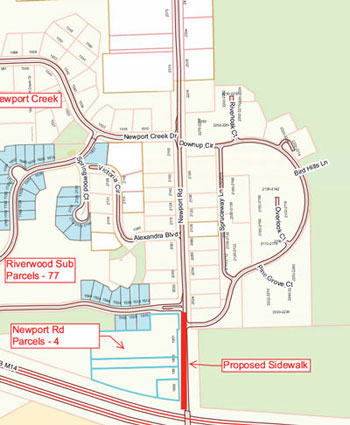
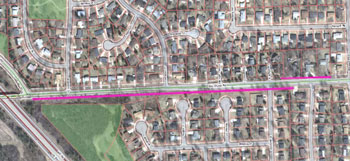
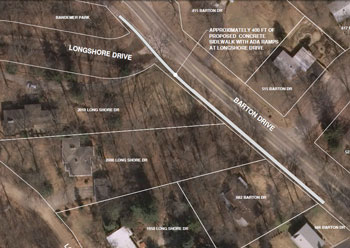
Sidewalks and bike lanes on Pontiac Trail and Barton Drive = improved safety for many Northside residents, users of Olson Park and users of the boardwalk to Bandemer Park.
Re Mental Health Courts:
The existence of “mental health courts” are rather experimental, but the implementation of “drug courts” in various jurisdictions has been a step in the right direction.
The American Medical Association has long diagnosed drug addiction as a disease, but citizens are often jailed due to drug possession on a “revolving door” basis without opportunity for effective medical treatment. Mental illness and illegal drug use often go hand-in-hand as co-occurring conditions; mental illness often impairs judgment and leads to substance abuse – and substance abuse can aggravate the symptoms of mental illness.
The State of Michigan recently restructured its administration of community mental health services to integrate it with it substance abuse programs. The courts should follow suit in this state. Effective professional mental health and substance abuse intervention as part of criminal sentencing can make a difference in reducing recidivism and providing needed direction for criminal defendants having such afflictions.
The successes of pilot programs addressing substance abuse in the Oakland County and Wayne County circuit court systems should not be overlooked and hopefully criminal defendants in Metro Detroit with mental health issues will also have opportunities for intensive professional intervention to address these often contributing factors to criminal behavior.